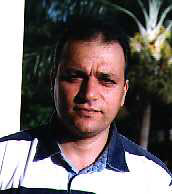 FISHING FISHING
 FISHING IN CANOES FISHING IN CANOES
Guinea has more than 300 Km of coast, a Continental shelf 80 Km wide, and a whole network of rivers and fresh water sources in the interior of the country. Despite its large potential, the fishing industry is still at a very primitive stage. Fishing, carried out in canoes, is artisanal. There are not adequate storage facilities, freezing units or industrial processing of marine products. The sector has been under deficit until 1996, when finally the sea products trade balance became positive. In 1997 the sector grew 10%.
Due to the low and still primitive exploitation of marine resources, Guinean waters are literally virgin. The abundance, size and quality of fish make Guinean waters a fisherman paradise. More than 50 species of commercial interest can be found in Guinean coasts. Resources consist on 130,000 tons of industrial fish and 10,000 tons of inland fish. The government, conscious of the high growth potential has encouraged the creation of fish and shrimp farms and is trying to deregulate the sector by getting rid of inefficient state owned Soguipeche.

|
 EXPORTING FISH TO THE EUROPEAN COMMUNITY EXPORTING FISH TO THE EUROPEAN COMMUNITY
The number of companies allowed to export has been reduced in only one year from 23 to 6. Jasmin Trading House might not be one of the bigger ones, but it has certainly found its niche. Specialized in commercializing fresh fish, it exports10 tons/week to the European market (France, Belgium and Italy). Like the rest of Guinean fishing companies, Jasmin Trading does not have a fishing fleet, instead it purchases products directly from local fishermen. Mr. Anouar Jichi, its general manager, explains that this way the directly contribute to develop artisanal fishing, one of the priorities of the government. Mr. Jichi, conscious of the strict quality controls imposed by the EU, has recently obtained a certificate of quality from the European Community. A small factory to manipulate and store fish is already under construction following international standards. With this new plant, Jasmin Trading plans to multiply by three its exports by next year and even fulfill its dream: enter the American market. |

